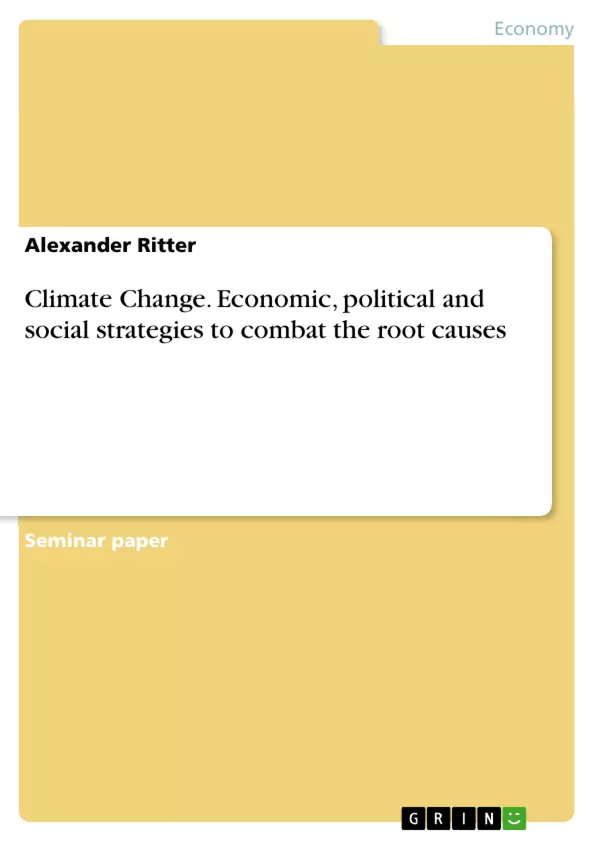A man-made exacerbation of climate change has been widely accepted by the scientific community and calls for a paradigm shift in economic thinking. The new imperative demands for the global economy to achieve a factor-10 reduction of carbon dioxide within the next four decades. This undoubtedly calls for radical changes in the political, the economic as well as in the societal dimension.
This essay reviews the different strategies that have been brought forwards by academics and activists aimed at combating global warming and assessing the effectiveness and legitimacy of such proposals.
Inhaltsverzeichnis (Table of Contents)
- Introduction
- Strategies for a needed paradigm shift – the global level:
- Obstacles and potential solutions to man-made climate change
- The underlying logic that reduces the effectiveness of a “soft” global governance solution to climate change
- In contrast to the softer, infective global governance solutions, there is also the idea of a global government
- The intensification of climate change and other environmental problems has been blamed on the increasing world population
- Another political solution to global warming is the issuance of emission-papers
- Furthermore there are structural problems with the global financial system
- Strategies for a needed paradigm shift – the national level:
- On a national level, taxes are a proven measure to lower the demand for energy-intensive products and services
- With taxation, discriminatory pricing should be avoided, to prevent real or perceived social injustices
- There are certainly a few political strategies that could and should be used in order to combat global warming
Zielsetzung und Themenschwerpunkte (Objectives and Key Themes)
This essay examines the different strategies proposed by academics and activists to combat global warming, aiming to assess the effectiveness and legitimacy of these proposals. The essay delves into the complexities of climate change as a global externality, highlighting the challenges of achieving a paradigm shift in economic and political thinking to address the issue.
- The need for a paradigm shift in economic thinking to combat climate change
- The challenges of global governance in addressing climate change, particularly the collective action problem
- The role of national policies, including taxation and combating lobbyism, in mitigating climate change
- The impact of global financial systems and unsustainable consumption patterns on climate change
- The importance of balancing climate change mitigation with social justice and economic development
Zusammenfassung der Kapitel (Chapter Summaries)
The essay begins by outlining the scientific consensus on the urgent threat of man-made climate change, emphasizing the need for a drastic reduction in greenhouse gas emissions. It then explores the complexities of global governance in addressing this issue, highlighting the challenges posed by the collective action problem and the lack of effective enforcement mechanisms. The essay examines various strategies proposed for a paradigm shift, including global governance solutions, international emissions trading schemes, and national policies aimed at reducing energy consumption.
The essay further delves into the role of national policies in addressing climate change, highlighting the potential and limitations of taxation measures, discriminatory pricing, and tackling lobbyism. It emphasizes the importance of finding a balance between climate change mitigation and social justice, acknowledging the potential for adverse consequences on low-income earners and developing nations.
Schlüsselwörter (Keywords)
This essay focuses on climate change, global warming, greenhouse gas emissions, global governance, collective action problem, paradigm shift, economic policy, political strategies, taxation, lobbyism, social justice, and sustainable development.
Frequently Asked Questions
What is the "factor-10 reduction" mentioned in climate strategies?
It refers to the radical goal for the global economy to reduce carbon dioxide emissions by 90% within the next four decades to combat global warming.
What is the "collective action problem" in global governance?
It is the difficulty of getting all nations to cooperate on climate change when individual countries might benefit from not participating while others pay the costs.
How can national taxes help reduce energy demand?
Taxes on carbon or energy-intensive products are proven measures to lower demand, provided they avoid social injustices through fair pricing.
What role does the global financial system play in climate change?
The essay highlights structural problems in the financial system that often favor short-term profit over long-term environmental sustainability.
Why is a paradigm shift in economic thinking necessary?
Because traditional economic models often treat environmental damage as an externality rather than a core cost, failing to address the root causes of man-made climate change.
- Quote paper
- Alexander Ritter (Author), 2017, Climate Change. Economic, political and social strategies to combat the root causes, Munich, GRIN Verlag, https://www.grin.com/document/379642



